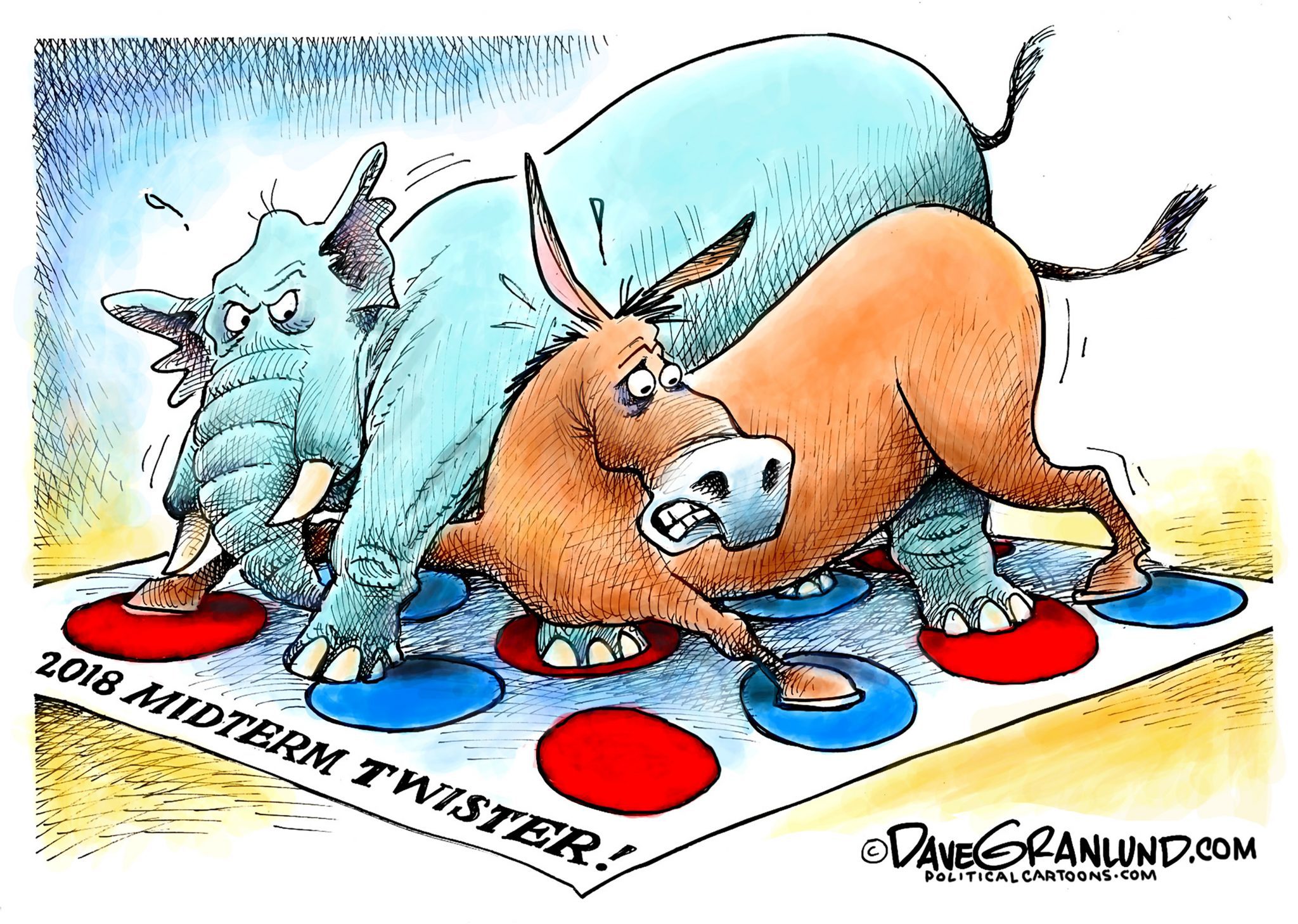BY MIKE W. RAY
 For the first time in several years, Democrats in Oklahoma are poised to recapture some political seats in the general election Nov. 6. That seemed to be the proverbial “bottom line” of the latest Oklahoma Observer Newsmakers program held recently at Full Circle Books in Oklahoma City.
For the first time in several years, Democrats in Oklahoma are poised to recapture some political seats in the general election Nov. 6. That seemed to be the proverbial “bottom line” of the latest Oklahoma Observer Newsmakers program held recently at Full Circle Books in Oklahoma City.
Moderator Arnold Hamilton, editor of The Oklahoma Observer, was joined by state Rep. Scott Inman, who “terms out” of the Legislature next month after 12 years as a state lawmaker, 7½ of those years as the House Minority Leader, and by John R. Wood, associate professor of political science at the University of Central Oklahoma. Wood has a PhD in Environmental Policy and Conflict Management, and before joining the UCO faculty four years ago he taught at Rose State College for nine years.
TEACHER RALLY CREATED NEW DYNAMIC
With the general election less than a month away, Hamilton asked his two guests whether they envision a “revolution” on Election Day.
“When I was first elected to the Legislature, in 2006, there were 44 Democrats in the House and [Democrat] Brad Henry beat [Republican] Ernest Istook in the governor’s race,” Inman recalled. Today the Oklahoma House has 28 Democrats and the Oklahoma Senate has just eight Democrats. “We’ve come a long way in the wrong direction,” Inman quipped.
However, the statewide teacher walkout earlier this year has created a new dynamic. “There’s a different focus among my constituents,” Inman said.
Besides the teacher rally at the state Capitol in April, Gov. Mary Fallin’s approval rating in July was just 19%, the lowest of any governor in the nation; for the past five consecutive years the state of Oklahoma experienced budget deficits that totaled a collective $3 billion and resulted in deep cuts to almost every state agency; and the U.S. Senate confirmation hearing for Supreme Court nominee Brett Kavanaugh energized many women politically.
‘DOWN BALLOT’ SEATS LOOK PROMISING
Democrats have “a good shot” at picking up a few “down ballot” seats next month, Inman predicted, and mentioned Julia Kirt and Carri Hicks. Kirt and Republican John Symcox are vying for the Senate District 30 seat vacated by now-Oklahoma City Mayor David Holt. Hicks, a school teacher; Republican Joe Howell, a veterinarian; and Christopher Hensley, an Independent, are competing for Ervin Yen’s state Senate District 40 seat.
Turning to congressional races, Wood said there’s a 71% chance that the U.S. House of Representatives will flip from Republican to Democrat next month. As for the U.S. Senate, “probably” the Democrats will lose or gain just one seat, he speculated, noting that the Democrats have 14 Senate seats to defend this year.
Kendra Horn has “the best opportunity” to flip an Oklahoma congressional seat, Wood said. Horn, an Oklahoma City Democrat, is running against incumbent 5th District Congressman Steve Russell, R-Choctaw.
Tulsa Democrat Tim Gilpin might have a chance to defeat Tulsa Republican Kevin Hern in the campaign for the open 1st District seat, which was vacated when Republican Jim Bridenstine was confirmed as the new administrator of the National Aeronautics and Space Administration. But Tahlequah Democrat Jason Nichols is a “dark horse” in his race against incumbent 2nd District Congressman Markwayne Mullin, a Westville Republican.
NON-PARTISAN REDISTRICTING PANEL NEEDED
What really is needed is an impartial, neutral commission to redraw political district lines in 2021, Wood said. “We need a non-partisan redistricting group in Oklahoma.”
On Jan. 15, the latest official records posted by the State Election Board showed Republicans comprised 46.75% of the state’s registered voters; Democrats 38.18%; Independents 14.82%; and Libertarians 0.24%.
Yet Republicans hold 73 of the 101 seats in the Oklahoma House of Representatives, 40 of the 48 seats in the Oklahoma Senate, plus every statewide elected office, all five of Oklahoma’s congressional seats and both U.S. Senate seats.
Referring to the decline in voter participation, Wood mused, “Why would you want to vote if the game is rigged?”
Inman said that during his tenure in the Legislature, “What I learned is to stop trying to get someone to switch parties.” Instead, engage in conversation and try to persuade that person to vote his/her personal interests rather than simply embracing a political party.
Inman used teacher pay as an example. Year after year, Republicans in the Legislature cut education budgets and refused to raise teacher salaries. Finally, teachers – many of whom are registered Republicans – rebelled, rallied en masse at the Capitol and helped oust several GOP legislators this year.
DO OKLAHOMA VOTERS HAVE GOP FATIGUE?
Hamilton asked his two guests whether they think Oklahomans are tired of Republicans after eight years of GOP total control of state government and two years of the Trump Administration.
“We’re still in that two-year honeymoon period” with the president, but Oklahomans are “oppositional,” Wood said. As Inman and Wood both have pointed out, Democrat Henry was elected governor when Republican George W. Bush was president, Republican Frank Keating was elected governor when Democrat Bill Clinton was president, and Republican Mary Fallin was elected governor when Democrat Barack Obama was president.
Over the last three decades, Democratic nominees for governor have captured a majority of the votes just twice. David Walters garnered 57.4% of the popular vote in 1990, and Brad Henry was re-elected in 2006 with 66.5% of the popular vote.
[When Henry first ran for governor, in 2002, he received a plurality but not a majority of the votes. His margin of victory was fewer than 7,000 votes out of 1,035,620 that were cast for Henry, a Democrat former state senator; Republican Steve Largent, a retired professional football player; and Tulsa attorney Gary Richardson, an Independent.]
Voters will decide Nov. 6 whether Fallin should be succeeded by a Democrat [former Attorney General Drew Edmondson] or by another Republican [Kevin Stitt].
EDUCATION, HEALTH CARE ARE HOT-BUTTON ISSUES
“What will drive people to the polls this year?” Hamilton asked.
Political research indicates education and health care – especially in rural areas, where several hospitals have closed in recent years – are the two top issues, Inman said. Health care is a big issue in rural areas, where several hospitals have closed in recent years, but barely registers on the political radar in the Oklahoma City and Tulsa metropolitan areas, where quality health care is readily available, Inman observed.
Wood concurred. “I think education is driving most of this,” he said.
MORE REPUBS THAN DEMS, BUT INDEPENDENTS GAINING
Wood reminded the audience that half of the eligible voters in Oklahoma did not cast a ballot in 2016, a presidential election year. Democrats “struggle with turnout,” while Republicans constantly emphasize voter participation, the professor added.
The voter registration gap between Republicans and Democrats in Oklahoma was 8% on Jan. 15 and, according to Wood, is about 10% now. However, Independents constitute approximately 15% of this state’s registered voters, and the “fastest growing groups of Independents” are “Millennials” and “Generation Z”. [The term Millennials is usually considered to apply to individuals who reached adulthood around the turn of the 21st century, and Generation Z is the demographic cohort that followed the Millennials.]
TERM LIMITS SHIFTED POWER TO NON-ELECTED PLAYERS
Lastly, an audience member asked Inman for his opinion about Oklahoma’s 12-year term limits for state elected officials.
When the Legislature convenes next year, many of its 149 members will have held office for just two years or less, Inman related. “Lobbyists run the show.” Power has shifted away from elected officials, and there’s a lack of historical and institutional knowledge at the state Capitol.
Prior to term limits, a few legislative seats were up for grabs at each election cycle, Inman said. Now, periodically there’s wholesale turnover. “That’s counter-productive to what the people want.”
– Mike W. Ray is semi-retired after a 45-plus-year career as a journalist on newspapers in Oklahoma and Texas, two years in public relations with Southwestern Bell Telephone, plus 19 years as a media director at the Oklahoma House of Representatives









One of the greatest con-games ever played is happening right now by the Republican Party. They have convinced the working class that it is a political party that advocates for them. This could not be further from the truth. Unfortunately the party leaders know that we now have a population that will believe biased sound bites and not look for the truth from reliable sources. The party is leveraging this ignorance of the masses to enable a republican party that now supports racism, religious intolerance, isolationism, greed and a willingness to compromise away morals and ethics. At one time, the party stood for fiscal responsibility, strong defense, strong public education, small government, reasonable taxes and regulations and even stronger morals and ethics. These traditional republican concepts have now been abandoned in order to win support from the racist, the religious bigots, and the greedy who do not believe in paying any taxes. The party leaders know that if they give a token reward to each of these groups to win their support, they can then motivate and control their votes. This is no different than what dictators and kings do to control their masses. It is also the reason our forefathers who founded this great country fled Europe long ago. The divide between the rich and the working class will only continue get bigger if our republican direction continues. This 2-tier society is not what our forefathers envisioned for our great country. It is tragic how soon we forget history.